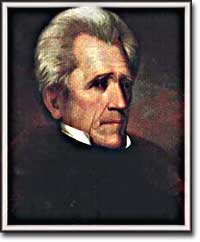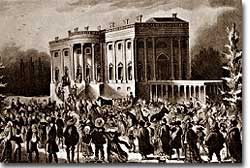24a. The Rise of the Common Man

Andrew Jackson considered himself a spokesperson for the common man.
Growth, expansion and social change rapidly followed the end of the War of 1812. Many an enterprising American pushed westward. In the new western states, there was a greater level of equality among the masses than in the former English colonies. Land was readily available. Frontier life required hard work. There was little tolerance for aristocrats afraid to get their hands dirty.
The west led the path by having no property requirements for voting, which the eastern states soon adopted, as well.
The Common Man always held a special place in America, but with Jackson, he rose to the top of the American political power system.
In the campaign of 1828, Jackson, known as "Old Hickory," triumphed over the aristocratic, reclusive and unpopular incumbent President John Quincy Adams.
The First Six Presidents
George Washington
John Adams
Thomas Jefferson
James Madison
James Monroe
John Quincy Adams
The first six Presidents were from the same mold: wealthy, educated, and from the east. Jackson was a self-made man who declared education an unnecessary requirement for political leadership. Indeed, Jackson launched the era when politicians would desperately try to show how poor they had been.
The election of 1828 was a rematch of the election of 1824 between John Quincy Adams and Jackson. In the earlier election, Jackson received more votes, but with no candidate having a majority, the House of Representatives chose Adams. Four years later the voices of the people were finally heard.
Jackson's inauguration in 1828 seemed to many the embodiment of "mob rule" by uneducated ruffians. Jackson rode to the White House followed by a swarm of well-wishers who were invited in. Muddy hob-nailed boots trod over new carpets, glassware and crockery were smashed, and chaos generally reigned. After a time, Jackson ordered the punch bowls moved outside to the White House lawn, and the crowd followed. Naturally, Jackson's critics were quick to point to the party as the beginning of the "reign of King Mob."
|
No one who was at Washington at the time of General Jackson's inauguration is likely to forget that period to the day of his death. To us, who had witnessed the quiet and orderly period of the Adams administration, it seemed as if half the nation had rushed at once into the capital. It was like the inundation of the northern barbarians into Rome, save that the tumultuous tide came in from a different point of the compass. The West and the South seemed to have precipitated themselves upon the North and overwhelmed it. On that memorable occasion you might tell a 'Jackson man' almost as far as you could see him. Their every motion seemed to cry out 'Victory!' – Arthur J. Stansbury, Jacksonian contemporary | ||
As a military hero, a frontiersman, and a populist, Jackson enchanted the common people and alarmed the political, social and economic elite. A Man of the People would now govern the nation — America did not disintegrate into anarchy.







